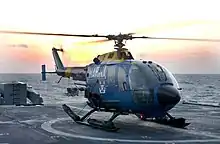| Mexican Navy | |
|---|---|
| Armada de México (Spanish) | |
 | |
| Founded | January 19, 1800 |
| Country | Mexico |
| Type | Navy |
| Role | Naval warfare |
| Size | 87,556 personnel (2024) |
| Part of | Secretariat of the Navy |
| Anniversaries | June 1, National Navy Day[1] |
| Engagements | |
| Commanders | |
| Current commander | Admiral José Rafael Ojeda Durán |
| Insignia | |
| Naval jack |  |
The Mexican Navy is one of the two independent armed forces of Mexico. The actual naval forces are called the Armada de México. The Secretaría de Marina (SEMAR) (English: Naval Secretariat) includes both the Armada itself and the attached ministerial and civil service. The commander of the Navy is the Secretary of the Navy, who is both a cabinet minister and a career naval officer.
The Mexican Navy's stated mission is "to use the naval force of the federation for external defense, and to help with internal order".[2] As of 2020, the Navy consists of about 68,200 men and women plus reserves,[3] over 189 ships, and about 130 aircraft.[4][5] The Navy attempts to maintain a constant modernization program to upgrade its response capability.
Given Mexico's large area of water (3,149,920 km2 (1,216,190 sq mi)) and extensive coastline (11,122 km (6,911 mi)), the Navy's duties are of great importance. Perhaps its most important on-going missions are the war on drugs and protecting PEMEX's oil wells in Campeche in the Gulf of Mexico. Another important task of the Mexican Navy is to help people in hurricane relief operations and other natural disasters.
The Mexican navy is the second largest navy in Latin America and North America, and the third largest in the Americas after the United States and Brazil.
History

.png.webp)
The Mexican Navy has its origins in the creation of the Ministry of War in 1821. From that year until 1939 it existed jointly with the Mexican Army in the organic ministry. Since its declaration of independence from Spain in September 1810, through the mid decades of the 19th century, Mexico found itself in a constant state of war, mostly against Spain which had not recognized its independence. Therefore, its priority was to purchase its first fleet from the U.S. to displace the last remaining Spanish forces from its coasts.[6]
The Mexican Navy has participated in many naval battles to protect and defend Mexico's interests. Some of the most important battles were:
- Attempts by Spain to reconquer Mexico
- Takeover of the San Juan de Ulúa fort (1821–1825)
- The invasion of Cabo Rojo (1829)
- Battle of Mariel (February, 1828)
The first French intervention in Mexico (The 'Pastry War') (November 1838 – March 1839)
- An entire Armada was captured at Veracruz
- Texan Independence (1836–1845)
- Yucatán Independence (1841–1848)
- The Mexican–American War (1846–1848)
- The Second French Intervention (1862–1867)
- The Mexican Revolution (1910–1919)
- First Battle of Topolobampo
- Second Battle of Topolobampo
- Third Battle of Topolobampo
- Action of 9 April 1914
- Fourth Battle of Topolobampo
Second invasion by the United States (April 9, 1914 – November 23, 1914)
Historical ships
|
|
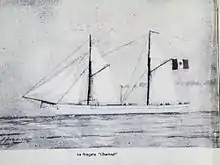 Mexican Navy gunboat Libertad in the 1870s
Mexican Navy gunboat Libertad in the 1870s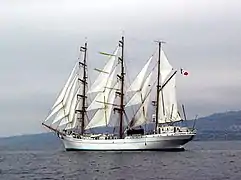 Mexican Navy training ship Cuauhtemoc in 2005
Mexican Navy training ship Cuauhtemoc in 2005
Organization
The President of Mexico is commander in chief of all military forces. Day-to-day control of the Navy lies with the Navy Secretary, José Rafael Ojeda Durán.[7] In Mexico there is no joint force command structure with the army, so the Secretary reports directly to the President. The Navy has a General Headquarters and three naval forces. There are furthermore eight regions (four on the Pacific coast, three on the Mexican Gulf coast and the Región Naval Central, grouping the naval forces, based in and around the capital Mexico City, such as the 7th Naval Infantry Brigade, the Central Special Operations Group and the Air Transport Squadron), thirteen zones, and fourteen naval sectors.
The Navy is divided into three main services designated as "forces":
Other notable services include:
Officers are trained at the Mexican Naval Academy, called the "Heroica Escuela Naval Militar" ("Heroic Military Naval School"), located in Antón Lizardo, Veracruz.

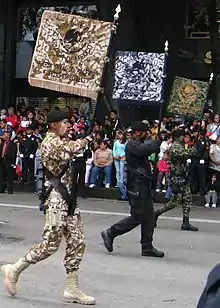
Naval Infantry
The Mexican Naval Infantry Corps was reorganized in 2007–2009 into 30 Naval Infantry Battalions (Batallones de Infantería de Marina – BIM), a paratroop battalion, a battalion attached to the Presidential Guard Brigade, two Fast Reaction Forces with six battalions each, and three Special Forces groups.[8] The Naval Infantry are responsible for port security, protection of the ten-kilometer coastal fringe, and patrolling major waterways.
The Naval Infantry also is responsible for 23 National Service Training Units under the responsibility of the Navy Secretary, enforcing the National Service obligation for Mexicans of teenage and young adult age.
Naval Aviation
Search and rescue units
In 2008, the Mexican Navy created its new search and rescue system, allocated in strategic ports at Pacific and Gulf of Mexico ports, to provide assistance to any ships which are in jeopardy or at risk due to mechanical failure, weather conditions or life risk to the crew. To provide such support, the Navy has ordered Coast Guard Defender class ships (two per station, and one 47-Foot Motor Lifeboat coast guard vessel). Other stations will be provided only with Defender-class boats.[9]
Maritime role
On April 1, 2014, SEMAR officially announced the creation of Port Protection Naval Units (Unidades Navales de Protección Portuaria: UNAPROP) which will include a marine section.[10][11] The main task of UNAPROPs is to ensure maritime surveillance and inspection.[12]
Training and education
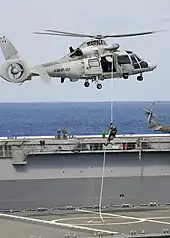

The Navy offers several options for graduate studies in their educational institutions:
It is the school where future officers are trained for the General Corps of the Navy. Candidates can enter upon completing high school. Upon completion of studies, graduates obtain the degree of Sub-Lieutenant and the title of Naval Science Engineer.
- Naval Medical School
This school Located in Mexico City, offers a career in medicine. Officers are trained with skills for the prevention and health care of naval personnel. By adopting a professional examination, graduates are commissioned Sub-Lieutenants.
- Naval Engineering School
In the Naval Engineering School, officers are responsible for the preventive and corrective maintenance of systems and electronic equipment installed on ships and installations of the Mexican Navy. This school offers career of Electronic Engineering and Naval Communications. It is located between the town of Mata Grape and Anton Lizardo, 32 km (20 mi) from the port of Veracruz.
- Naval Nursing School
Here the time to achieve a nursing degree lasts eight semesters. Officers are trained with the knowledge and skills necessary to enable them to assist medical personnel in caring for patients in hospitals, sanatoriums, clinics, health sections on land, aboard ships and at The Naval Medical Center.
- Naval Aviation School
The Naval Aviation School trains pilots for the Mexican Naval Aviation as well as staff from the Federal Preventive Police and Naval personnel from various countries of Central America. This school is located on La Paz, Baja California Sur.[13]
- Search, Rescue and Diving School
Located in Acapulco, members of The Navy are trained for marine search, rescue and diving. It also trains state police officers and firefighters.
Rank insignia
Modernization and budget
The annual Navy's budget is in a one to three proportion of the national budget relative to the Mexican Army and Mexican Air Force. The Navy has a reputation for being well-run and well-organized. This reputation allows for a close relationship with the United States Navy (USN), as evidenced by the procurement of numerous former USN ships.
Ships
The Secretary of the Navy, Admiral Mariano Francisco Saynez Mendoza, announced on October 1, 2007, detailed plans to upgrade and modernize the country's naval capabilities. On the following day, La Jornada newspaper from Mexico City, disclosed the Mexican Navy plans, which are among others, to build six offshore patrol vessels (OPVs) with a length of 86 metres (282 ft), 1,680 tons and each housing a Eurocopter Panther helicopter as well as small high-speed interception boats. The budget for this project is above US$200 million.
Another project is to build 12 CB 90 HMN high speed (50 knots (93 km/h; 58 mph)) interception boats under license from a Swedish boat company Dockstavarvet to the Mexican Navy. Also, a number of fully equipped planes for surveillance and maritime patrol are being considered. Combinations of options and development are being defined.
Shipbuilding
The Mexican Navy depends upon their naval shipyards for construction and repairs of their ships. There are five shipyards located in the Gulf of Mexico and Pacific Ocean:
- Gulf of Mexico
- Naval shipyard 1 (ASTIMAR 1) – Tampico, Tamaulipas
- Naval shipyard 3 (ASTIMAR 3) – Coatzacoalcos, Veracruz
- Pacific Ocean
Missiles
The Mexican Navy initiated studies to develop and construct its first missile, according to a May 2005 interview with the undersecretary of the Navy, Armando Sanchez, the missile was to have an average range of 12 to 15 kilometres (7.5 to 9.3 mi) and be able to target enemy ships and aircraft. The undersecretary added that they already had the solid propellant, and the basic design of the missile. All aspects relative to their fuselage were solved as well as the launch platforms. The Mexican Navy was developing the software to direct the missile to its target. In July 2008, the project was reported to be 80% complete. Despite this effort, the missile development was canceled in 2009 due to "problems with the propulsion system".[14]
Radar modernization
In 2009, the Mexican Navy began operating a batch of new MPQ-64 Sentinel radars in the oil-rich Gulf of Mexico. The radar network was installed in 2007 for a trial phase while military personnel were trained to get familiar with the system. The new installations will work together with combat surface vessels that patrol the area.[15][16]




Present fleet
| Class | Image | Type | Ships | Origin | |
|---|---|---|---|---|---|
| Frigates (5) | |||||
| Allende class |  | Multipurpose Anti-submarine frigate | F211 Ignacio Allende F212 Mariano Abasolo F213 Guadalupe Victoria F214 Francisco Javier Mina | United States – ex-US Navy Knox-class frigate | |
| Reformador class[17] | .jpg.webp) |
Multipurpose Frigate | F101 Benito Juárez[18] | Netherlands/Mexico – Ships being built in The Netherlands and Mexico. At least 8 ships planned for fleet modernisation plan. | |
| Missile boats (2) | |||||
| Huracán class |  | Missile boat | A301 Huracán A302 Tormenta | Israel – ex-Israeli Navy Sa'ar 4.5-class missile boat | |
| Patrol vessel and other Warships (35) | |||||
| Oaxaca class | .JPG.webp) | Offshore patrol vessels | P161 Oaxaca P162 Baja California P163 Independencia P164 Revolución P165 Chiapas[19] P166 Hidalgo[19] P167 Jalisco[20] P168 Tabasco | Mexico | |
| Durango class | 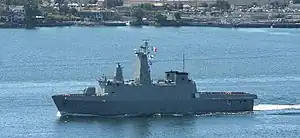 | Offshore Patrol Vessel | P151 Durango P152 Sonora P153 Guanajuato P154 Veracruz | Mexico | |
| Sierra class |  | Corvette | P141 Sierra P143 Prieto P144 Romero | Mexico | |
| Holzinger class |  | Offshore patrol vessels | P131 Holzinger P132 Godínez P133 De la Vega P134 Berriozabal | Mexico | |
| Uribe class | Offshore patrol vessels | P122 Azueta P123 Baranda P124 Bretón P125 Blanco P126 Monasterio | Spain | ||
| Valle class | .jpg.webp) | Converted Minesweeper / Offshore patrol vessels | P102 Juan de la Barrera P103 Mariano Escobedo P104 Manuel Doblado P106 Santos Degollado P108 Juan N. Álvarez P109 Manuel Gutiérrez Zamora P110 Valentín Gómez Farías P112 Francisco Zarco P113 Ignacio L. Vallarta P114 Jesús González Ortega P117 Mariano Matamoros | United States – ex-Auk-class minesweeper | |
| Coastal patrol ships (44) | |||||
| Tenochtitlan class[21][22] |  | Coastal patrol | PC331 Tenochtitlan PC332 Teotihuacan PC333 ARM Palenque PC334 ARM Mitla PC335 ARM Uxmal PC336 ARM Tajin[23] PC337 ARM Tulum[24] PC338 ARM Monte Albán[25] PC339 ARM Bonampak[26] PC340 Chichen Iztzá | Netherlands/Mexico Based on Damen Stan Patrol 4207 | |
| Azteca class |  | Coastal patrol | PC202 Cordova PC206 Rayón PC207 Rejón PC208 De la Fuente PC209 Guzmán PC210 Ramírez PC211 Mariscal PC212 Jara PC214 Colima PC215 Lizardi PC216 Mugica PC218 Velazco PC220 Macías PC223 Tamaulipas PC224 Yucatán PC225 Tabasco PC226 Cochimie PC228 Puebla PC230 Vicario PC231 Ortíz | United Kingdom Mexico | |
| Demócrata class | Coastal patrol | PC241 Demócrata PC242 Francisco I. Madero | Mexico | ||
| Cabo class | Coastal patrol | PC271 Corriente PC272 Corso PC273 Catoche | Mexico | ||
| Punta class | Coastal patrol | PC-281 Morro PC-282 Mastún | Mexico | ||
| Interceptors | |||||
| Polaris class | 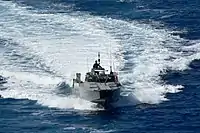 | Small Patrol vessel | 44 In service | Sweden | |
| Polaris II class |  | Small Patrol vessel | 6 In service + 17 under construction | Mexico | |
| Acuario A/B class | Patrol vessel | In service | Mexico | ||
| Isla class | Patrol boat | In service | Mexico | ||
| Amphibious ships (3) | |||||
| Papaloapan class | _sits_off_the_coast_of_Mississippi_preparing_to_assist_with_Hurricane_Katrina_relief_efforts_along_the_Gulf_Coast.jpg.webp) | Tank landing ship | A411 Papaloapan A412 Usumacinta | United States – ex-USN Newport-class tank landing ship | |
| Panuco class | 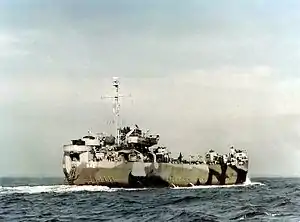 | Tank landing ship | A402 Manzanillo | United States – ex-US Navy USS Clearwater County, transferred in 1972 | |
| Logistic support vessel (2) | |||||
| Montes Azules class |  | Landing ship | BAL01 Montes Azules BAL02 Libertador (construction completed, inaugurated on September 10, 2012)[27] | Mexico | |
| TBD class | Supply ship | BAL11 Isla Madre Launched July 11, 2016.[25] | Netherlands Based on Damen Stan 5009 Fast Crew Supplier | ||
| Mine counter-measure (6) | |||||
| Banderas class | Minesweeper | Banderas Magdalena Kino Yavaros Chamela Tepoca | United States | ||
| Auxiliary vessels | |||||
| Huasteco class | Multipurpose logistics vessel | AMP01 Huasteco AMP02 Zapoteco | Mexico | ||
| Maya class | Multipurpose | ATR01 Maya ATR02 Tarasco | Mexico | ||
| B.E.Cuauhtémoc class |  | Three-masted barque sail training ship | BE01 Cuauhtémoc | Spain | |
The Mexican Navy includes 60 smaller patrol boats and 32 auxiliary ships. It acquired 40 fast military assault crafts, designated CB 90 HMN, between 1999 and 2001 and obtained a production license in 2002, enabling further units to be manufactured in Mexico.
Modern equipment
| Vehicle/System | Type | Versions | |||
|---|---|---|---|---|---|
| Armoured Vehicles | |||||
| BTR-60/BTR-70 | Amphibious Armored Personnel Carrier | APC-70 | |||
| Carat Security Group | Armoured car | Wolverine (Escorpion) | |||
| Renault Sherpa Light[28] | Light Armored Vehicle | MACK Sherpa Scout | |||
| Land Rover | Military light utility vehicle | Defender 4x4 | |||
| Infantry Transport Vehicles | |||||
| AM General HMMWV[29][30] | Military light utility vehicle | M1026, M1038, M1151 | |||
| Ford-150[31] | Pickup truck | 4x4 F-150 series pick up | |||
| Ford-250[31] | Pickup truck | 4x4 F-250 series pick up | |||
| Dodge Ram[32] | Pickup truck | 4x4 Pick up | |||
| Mercedes-Benz G-Wagen[33][34] | Military light utility vehicle | 4x4 G-class | |||
| Trucks | |||||
| Mercedes-Benz Zetros | Military truck | 6x6 truck | |||
| Ural-4320[35] | Military truck | Off-road 6x6 truck | |||
| Unimog U-4000[36][37] | Military truck | 4x4 truck | |||
| Gama Goat | Amphibious 6-wheeled vehicle | 6x6 truck | |||
| Freightliner M2[38] | Truck | 4x2 truck | |||
Individual weapons and equipment
| Name | Versions | Type |
|---|---|---|
| M16A2 rifle | 5.56×45mm NATO | Assault rifle |
| M4 Carbine | 5.56×45mm NATO | Carbine |
| IMI Galil | 5.56×45mm NATO | Assault rifle |
| Heckler & Koch MP5 | 9×19mm | Submachine gun |
| Heckler & Koch UMP | .45 ACP | Submachine gun |
| FN P90 | 5.7×28mm | Submachine gun |
| Colt M1911 | .45 ACP | Semi-automatic pistol |
| Beretta | 9x19mm Parabellum | Pistol |
| Glock 17 | 9x19mm Parabellum | Semi-automatic pistol |
| Five-seveN | 5.7x28mm | Semi-automatic pistol |
| Heckler & Koch MSG90 | 7.62×51mm NATO | Sniper rifle |
| Barrett M82 | .50 BMG | Anti-material rifle |
| Remington 700 | 7.62×51mm NATO | Sniper rifle |
| FN Minimi | 5.56×45mm NATO | Light machine gun |
| CETME Ameli[39] | 5.56×45mm NATO | Light machine gun |
| GAU-19 | 12.7×99mm NATO | Rotary machinegun |
| M2 Browning machine gun | 12.7×99mm NATO | Heavy machine gun |
| M134 | 7.62×51mm NATO | Rotary machinegun |
| STK 40 AGL | 40mm | Automatic grenade launcher |
| Milkor MGL | 40mm | Grenade launcher |
| M203 grenade launcher | 40mm | Grenade launcher |
| Remington 1100 | 12 | Semi-automatic shotgun |
Artillery
| Name | Versions | Type | ||
|---|---|---|---|---|
| Self-propelled artillery | ||||
| Bofors 40 mm Automatic Gun L/70 | 40mm | Anti-aircraft autocannon | ||
| Oerlikon | 20mm | Anti-aircraft autocannon | ||
| Shipboard anti-aircraft artillery | ||||
| Phalanx CIWS | 20mm | Close in Weapon System | ||
| Multiple rocket launchers | ||||
| FIROS | 122mm | multiple rocket launcher | ||
| Towed artillery | ||||
| OTO Melara Mod 56 | 105mm | Towed howitzer | ||
| K6 | 120mm | Heavy mortar | ||
| M29 | 81mm | Medium mortar | ||
| Brandt LR | 60mm | Light mortar | ||
| Bofors 40 mm Automatic Gun L/60 | 40mm | Towed anti-aircraft autocannon | ||
| Bofors 40 mm Automatic Gun L/70 | 40mm | Towed anti-aircraft autocannon | ||
| Oerlikon | 20mm | Towed anti-aircraft autocannon | ||
| Anti-shipping missiles | ||||
| Gabriel | Mk. II | Anti-ship missile | ||
| RGM-84L Harpoon | Block II | Anti-ship missile | ||
| Anti-aircraft missiles | ||||
| SA-18 | 72.2mm | Surface-to-air missile | ||
| RIM-116[40] | RIM-116 Rolling Airframe Missile (RAM) | Surface-to-air missile | ||
| RIM-162[41] | RIM-162 Evolved SeaSparrow Missile (ESSM) | Surface-to-air missile | ||
| Light anti-tank weapons | ||||
| RPG-75 | Anti-tank weapon | 68mm | ||
| B300 | Rocket-propelled grenade | 82mm | ||
Aircraft inventory
Future
For the year 2008 budget, the Mexican Congress approved a US$15 million fund to build only 17 out of the 60 combat boats requested. These ships, designated CB 90 HMN, are to increase the Mexican Navy's fast boat fleet. Additional budgets will be awarded each passing year.[42] In total, the Mexican Navy has over 189 operational ships.[4]
In January 2013, the 112th Session of US Congress authorized the transfer of the Oliver Hazard Perry-class frigates USS Curts and USS McClusky to the Mexican Navy,[43] but due to the cost of overhauling the vessels and the removal of all the weapons systems and most of the electronics and radar gear by the USN prior to transfer, this is still undecided by Mexico. The offer expired on January 1, 2016.[43]
2014
On March 25, 2014 Beechcraft Corporation received an order of 2 T-6C+ military trainers from the Mexican Navy.[44]
On June 24, 2014, the Mexican Government requested the purchase of 5 UH-60Ms in USG configuration from the U.S.; its estimated cost is $225 million.[45] Also on June 24, BAE Systems announced it was awarded a contract by the Mexican Government to supply the navy with 4 Mk 3 57mm naval guns, for the ships of the Reformador class.[46]
See also
References
- ↑ "Día de la Marina". sct.gob.mx. Archived from the original on May 31, 2015. Retrieved December 24, 2014.
- ↑ "Mission and objectives" Archived July 7, 2007, at the Wayback Machine (in Spanish)
- ↑ "Secretaria de Marina – Armada de México". Archived from the original on September 24, 2015. Retrieved December 24, 2014.
- 1 2 Archived September 11, 2008, at the Wayback Machine Rendición de cuentas SEMAR 2006 página 40
- ↑ "Material Aereo" Archived February 5, 2007, at the Wayback Machine(outdated page) (in Spanish)
- ↑ "History of the Mexican Navy ships". Archived from the original on January 10, 2010. Retrieved April 1, 2017.
- ↑ "Secretaría de Marina | Gobierno | gob.mx". Archived from the original on June 6, 2016. Retrieved June 23, 2016.
- ↑ Informe 2009 Secretaria de Marina – Armada de México
- ↑ "Textron Systems Brand Change". Archived from the original on June 13, 2009. Retrieved December 24, 2014.
- ↑ "Mexican Navy increasing coast guard capabilities". Jane's. Archived from the original on December 24, 2014. Retrieved December 24, 2014.
- ↑ Noticieros Televisa (March 31, 2014). "Crea Marina Unidades Navales de Protección Portuaria". televisa.com. Archived from the original on December 24, 2014. Retrieved December 24, 2014.
- ↑ "Unidades de Marina vigilarán 19 puertos del país a partir del martes". Excélsior. March 31, 2014. Archived from the original on December 24, 2014. Retrieved December 24, 2014.
- ↑ SIAL Sistema Informativo Aeronáutico Latinoamericano Archived July 6, 2012, at the Wayback Machine
- ↑ Mexican Naval missile Archived July 2, 2013, at the Wayback Machine (in Spanish)
- ↑ "En marzo iniciarán operaciones radares de la Armada" (in Spanish). NOTIMEX. December 27, 2008. Archived from the original on December 29, 2008. Retrieved December 27, 2008.
- ↑ "ThalesRaytheonSystems receives contract to support Mexican homeland security, protect Gulf oil infrastructure". Thales Raytheon Systems. May 11, 2006. Archived from the original on October 13, 2008. Retrieved December 27, 2008.
- ↑ "En la presente Administración se impulsa el desarrollo de la Flota Naval con el Diseño, Construcción y Reparación de Buques de la SEMAR". Archived from the original on October 8, 2018. Retrieved October 7, 2018.
- ↑ "Launch date scheduled for Mexico's long-range patrol vessel". Archived from the original on October 8, 2018. Retrieved October 7, 2018.
- 1 2 "3er Informe De Labores" (PDF). Archived (PDF) from the original on October 4, 2015. Retrieved October 3, 2015.
- ↑ "La Secretaría de Marina pone a flote la Patrulla Oceánica ARM "HIDALGO" para la Armada de México". Archived from the original on September 20, 2016. Retrieved September 5, 2016.
- ↑ "Fourth Damen Stan Patrol 4207 patrol vessel for Mexican Navy". August 23, 2013. Archived from the original on September 15, 2013. Retrieved August 23, 2013.
- ↑ "Mexican Navy contracts Damen for fifth Tenochtitlan-class Patrol Vessel (Stan Patrol 4207)". December 12, 2013. Archived from the original on December 18, 2013. Retrieved December 18, 2013.
- ↑ "Mexican Navy orders sixth Tenochtitlan-class Patrol Vessel (Stan Patrol 4207) from DAMEN". April 1, 2014. Archived from the original on April 7, 2014. Retrieved April 4, 2014.
- ↑ "MEXICAN NAVY AND DAMEN SIGN CONTRACT FOR TWO VESSELS". Archived from the original on November 29, 2014. Retrieved April 3, 2015.
- 1 2 "LA SECRETARÍA DE MARINA-ARMADA DE MÉXICO REALIZA BOTADURA DEL BUQUE DE APOYO LOGÍSTICO ARM "LIBERTADOR" (BAL-02), EN SALINA CRUZ, OAXACA". Archived from the original on July 13, 2016. Retrieved July 14, 2016.
- ↑ "4° Informe de Gobierno" (PDF). Presidencia de la República. September 1, 2016. Archived (PDF) from the original on September 16, 2016. Retrieved September 2, 2016.
- ↑ "La Secretaría de Marina- Armada de México realiza la botadura de la patrulla costera Arm "Monte Albán" (PC-338)". Archived from the original on September 14, 2012. Retrieved September 12, 2012.
- ↑ "Mexican military parades variety of new equipment – IHS Jane's 360". September 21, 2016. Archived from the original on September 21, 2016.
- ↑ "AM General Exhibe el Humvee HMMWV M1151B1 en DITDEF 2013". Infodefensa.com. May 19, 2013. Retrieved January 18, 2020.
- ↑ "México incorporó más de 6.000 vehículos en seis años". Infodefensa.com. June 9, 2018. Retrieved January 18, 2020.
- 1 2 "Secretaria de Marina – Armada de México". Archived from the original on September 24, 2015. Retrieved December 24, 2014.
- ↑ "Secretaria de Marina – Armada de México". Archived from the original on September 24, 2015. Retrieved December 24, 2014.
- ↑ "Recibe Semar vehículos para incrementar capacidad operativa". EL INFORMADOR. Archived from the original on December 29, 2016. Retrieved December 24, 2014.
- ↑ "LA SECRETARÍA DE MARINA CONTINÚA INCREMENTANDO SU CAPACIDAD OPERATIVA CON UNIDADES TODO TERRENO". Archived from the original on July 16, 2011. Retrieved July 26, 2009.
- ↑ "Another Batch of Russian Trucks to be Shipped to Latin America". Archived from the original on January 3, 2017. Retrieved January 2, 2017.
- ↑ "Secretaria de Marina – Armada de México". Archived from the original on September 24, 2015. Retrieved December 24, 2014.
- ↑ "Unimog Image". Archived from the original on February 13, 2010. Retrieved September 29, 2009.
- ↑ "Secretaria de Marina – Armada de México". Archived from the original on September 24, 2015. Retrieved December 24, 2014.
- ↑ "CETME Ameli". Archived from the original on July 28, 2009. Retrieved November 22, 2009.
- ↑ "Raytheon delivers RAM launcher for Mexican Navy POLA OPV". Archived from the original on October 23, 2018. Retrieved October 23, 2018.
- ↑ "Mexico buying Evolved Seasparrow missiles for new Sigma corvette". Archived from the original on August 15, 2018. Retrieved November 21, 2018.
- ↑ It was published within the Chapter 13 of the SEMAR 2008 final budget, by the SHCP, the Mexican finance ministry for this period.
- 1 2 "H.R. 6649 (112th): Naval Vessels Transfer Act of 2012". USA 112th CONGRESS, 2nd. session, H. R. 6649. govtrack.us. January 1, 2013. Archived from the original on March 23, 2013. Retrieved April 13, 2013.
- ↑ "Textron – Mexican Navy places initial order for Beechcraft T-6C+ trainers". Archived from the original on December 24, 2014. Retrieved December 24, 2014.
- ↑ "Mexico – UH-60M Black Hawk Helicopters – The Official Home of the Defense Security Cooperation Agency". Archived from the original on December 24, 2014. Retrieved December 24, 2014.
- ↑ "Newsroom – BAE Systems". Archived from the original on December 24, 2014. Retrieved December 24, 2014.
External links
- Secretary of the Navy Official site (Spanish)
- Naval Infantry official site (Spanish)
